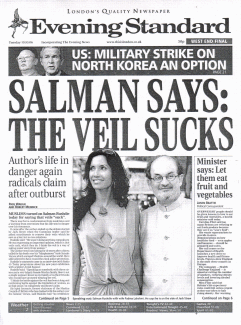Bill Rammell, the higher education minister, today weighed into the debate over Muslim women wearing the veil by offering his support to universities that banned the full-face veil.
He repeated the views he expressed on EducationGuardian.co.uk last month after a year of visits to university campuses to talk to Muslim students. Muslim students were entitled to ask for tolerance and consideration but there were limits to what they could and should ask for, argued Mr Rammell.
He said that Imperial College was wrong to attempt to ban women students from wearing the hijab, which covers their heads. The university’s proposed code was amended after protests. But Imperial was right to insist on banning the niqab which covers the face, argued Mr Rammell.
Today he told the Evening Standard newspaper: “I’m not dictating hard and fast rules, as dress codes are a matter for university authorities. But Imperial College recently banned the face veil and I think that this is arguably the best decision. Many teachers would feel very uncomfortable about their ability to teach students who were covering their faces.”
Mr Rammell added: “And I doubt many students would feel it was acceptable to be taught by someone who had chosen to veil their face.”
The National Union of Students (NUS) condemned Mr Rammell’s comments as “unproductive”.
Ruqaayah Collector, the NUS’s black students officer, said Imperial was considered a bad example of how to tackle the issue among other universities. “As a Muslim woman who wears the hijab, I’m worried the debate will go the same way as in France and other countries in Europe. It starts off with this and could move onto other forms of clothing.
“We need the Muslim community on board if we are going to fight extremism. Muslims should feel comfortable going to their MP, however they want to dress. It’s important to respect personal choices. It is a woman’s right to choose how they dress and not be told by men,” said Ms Collector.

 “Sunday saw people gathering to commemorate the 70th anniversary of the great battle of Cable Street. On that day progressive people of all kinds rallied to protect the significant minority of immigrants in London’s east end against the strutting jackboots of a domestic fascism, one of whose very arguments was against the very ‘separateness’ of the Jews who lived there. Their very garb, unusual diets, habits of living in close proximity to each other was a standing affront to the beef-eating Englishness of the Moselyites. ‘Leave the Jews alone’ was the response of the best of the British left. Let them eat dress and live as they want. It is a call that should be echoed about today’s whipping boys, the Muslims.”
“Sunday saw people gathering to commemorate the 70th anniversary of the great battle of Cable Street. On that day progressive people of all kinds rallied to protect the significant minority of immigrants in London’s east end against the strutting jackboots of a domestic fascism, one of whose very arguments was against the very ‘separateness’ of the Jews who lived there. Their very garb, unusual diets, habits of living in close proximity to each other was a standing affront to the beef-eating Englishness of the Moselyites. ‘Leave the Jews alone’ was the response of the best of the British left. Let them eat dress and live as they want. It is a call that should be echoed about today’s whipping boys, the Muslims.” “With one article in a local newspaper, Jack Straw has built up the walls of ignorance and division ever higher. A Muslim community that has been on the defensive for years is now finding itself facing a barrage of criticism about the way it chooses to express its faith; jeopardising its basic right of religious freedom. I oppose Mr Straw asking Muslim women who talk to him to take off their veils, not because I believe the veil is compulsory in Islam but rather because his politically motivated opinions have created a climate of intolerance against the veil and those who wear it.”
“With one article in a local newspaper, Jack Straw has built up the walls of ignorance and division ever higher. A Muslim community that has been on the defensive for years is now finding itself facing a barrage of criticism about the way it chooses to express its faith; jeopardising its basic right of religious freedom. I oppose Mr Straw asking Muslim women who talk to him to take off their veils, not because I believe the veil is compulsory in Islam but rather because his politically motivated opinions have created a climate of intolerance against the veil and those who wear it.” Muslims turned on Salman Rushdie today for saying that veils “suck”. It came after the author stoked up the debate started by Jack Straw when the Commons leader said he asked constituents to remove their veils which he saw as a barrier to race relations.
Muslims turned on Salman Rushdie today for saying that veils “suck”. It came after the author stoked up the debate started by Jack Straw when the Commons leader said he asked constituents to remove their veils which he saw as a barrier to race relations. “… the hijab, niqab, jilbab, chador and burqa. I can’t think of a more dramatic visual symbol of oppression, the inescapable fact being that the vast majority of women who cover their hair, faces and bodies do so because they have no choice…. Muslim women in this country may [sic] be telling the truth when they say they are covering their hair and faces out of choice, but that doesn’t mean they haven’t been influenced by relatives and male clerics….
“… the hijab, niqab, jilbab, chador and burqa. I can’t think of a more dramatic visual symbol of oppression, the inescapable fact being that the vast majority of women who cover their hair, faces and bodies do so because they have no choice…. Muslim women in this country may [sic] be telling the truth when they say they are covering their hair and faces out of choice, but that doesn’t mean they haven’t been influenced by relatives and male clerics….